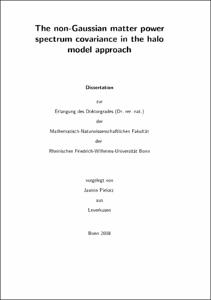Online-Ausgabe in bonndoc: https://nbn-resolving.org/urn:nbn:de:hbz:5N-14952
urn: https://nbn-resolving.org/urn:nbn:de:hbz:5N-14952,
author = {{Jasmin Pielorz}},
title = {The non-Gaussian matter power spectrum covariance in the halo model approach},
school = {Rheinische Friedrich-Wilhelms-Universität Bonn},
year = 2008,
note = {
Weak gravitational lensing is one of the most promising tools to analyze the nature of dark energy and dark matter. In order to constrain cosmological parameters with this method a good theoretical understanding of the underlying dark matter density field is necessary. This work provides an analytical treatment of higher-order correlation functions in the dark matter density field and compares the results obtained with numerical N-body simulations. The tool of choice is a semi-analytic halo model which combines results from perturbation theory and N-body simulations. The main emphasis of this work is on the fourth-order correlation function and its Fourier counterpart, the trispectrum, since it allows us to study the non-Gaussianities of the dark matter field and to calculate the full non-Gaussian covariance of the power spectrum. This provides a way to estimate the error and mode coupling in the dark matter power spectrum to higher accuracy than has been previously.
After deriving an analytical expression for the expectation value of the three-dimensional and the convergence power spectrum covariance, we use the halo model to make explicit predictions for different cosmological models. Additionally, we analyze the impact of a stochastic concentration parameter on the non-Gaussian contribution to the power spectrum covariance. To minimize the computational effort to calculate the full non-Gaussian covariance, different approximations are studied within the halo model approach, and a fitting formula is derived that allows instant calculation of the convergence power spectrum covariance over a wide range of cosmological parameters.
url = {https://hdl.handle.net/20.500.11811/3658}
}






